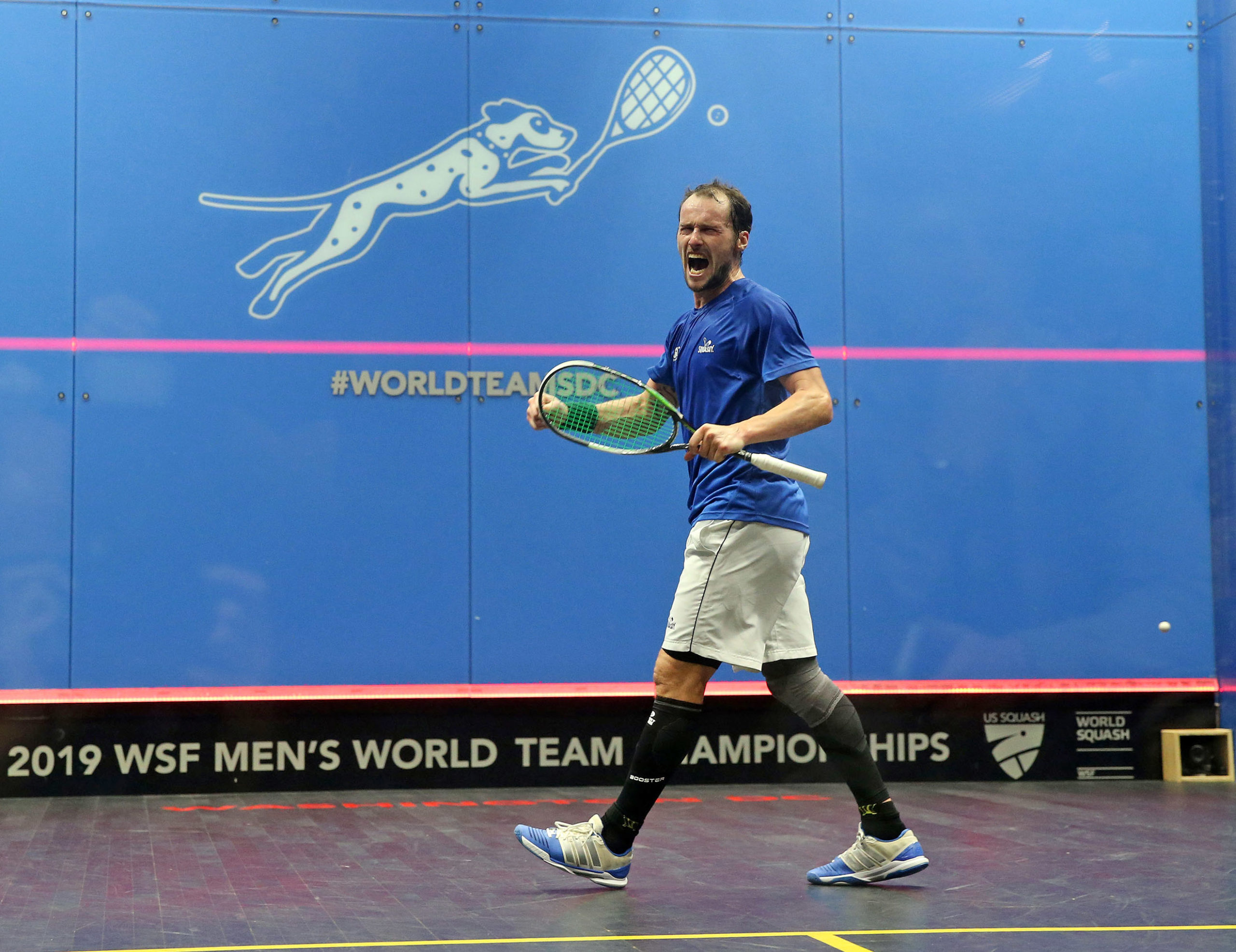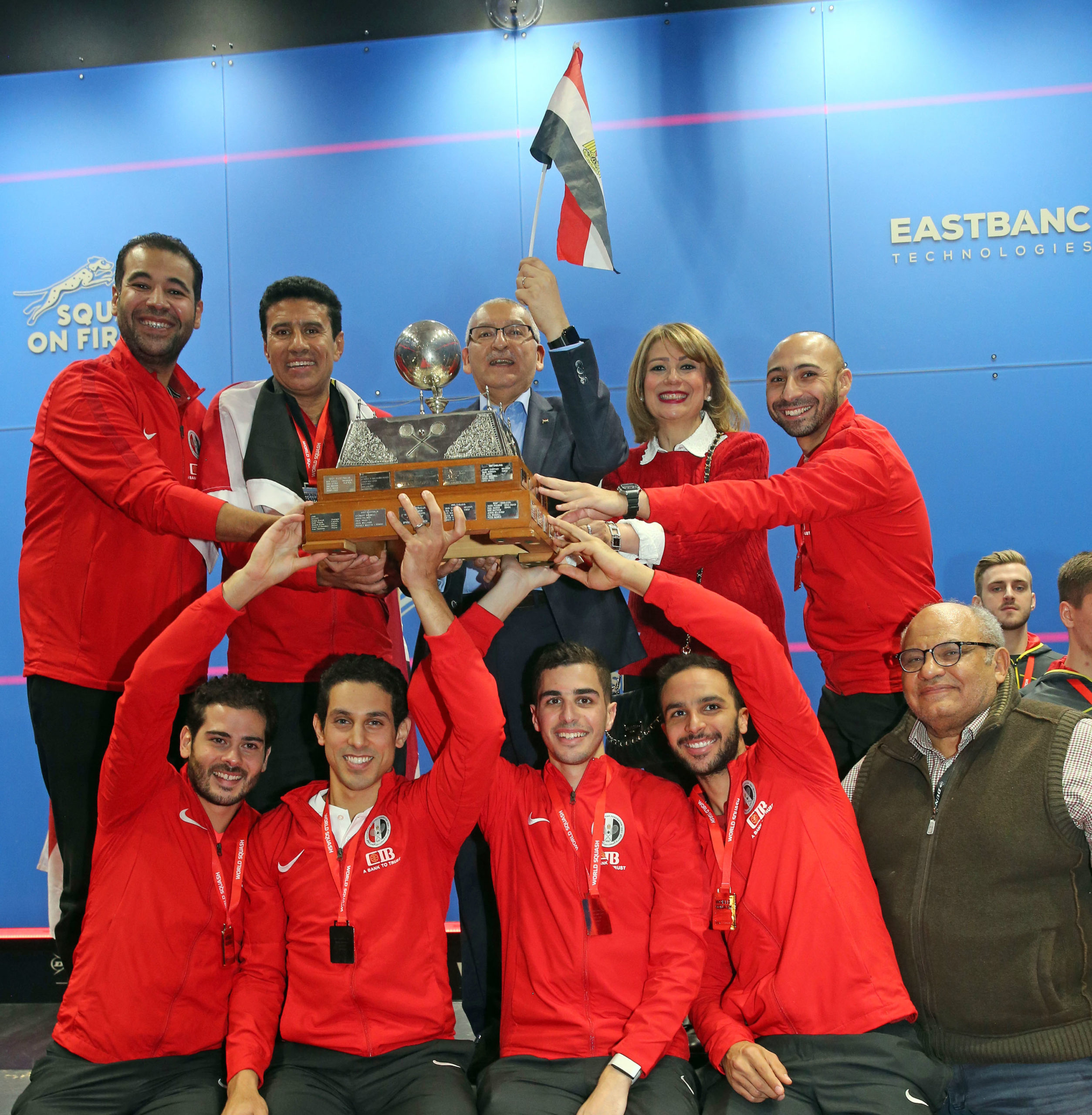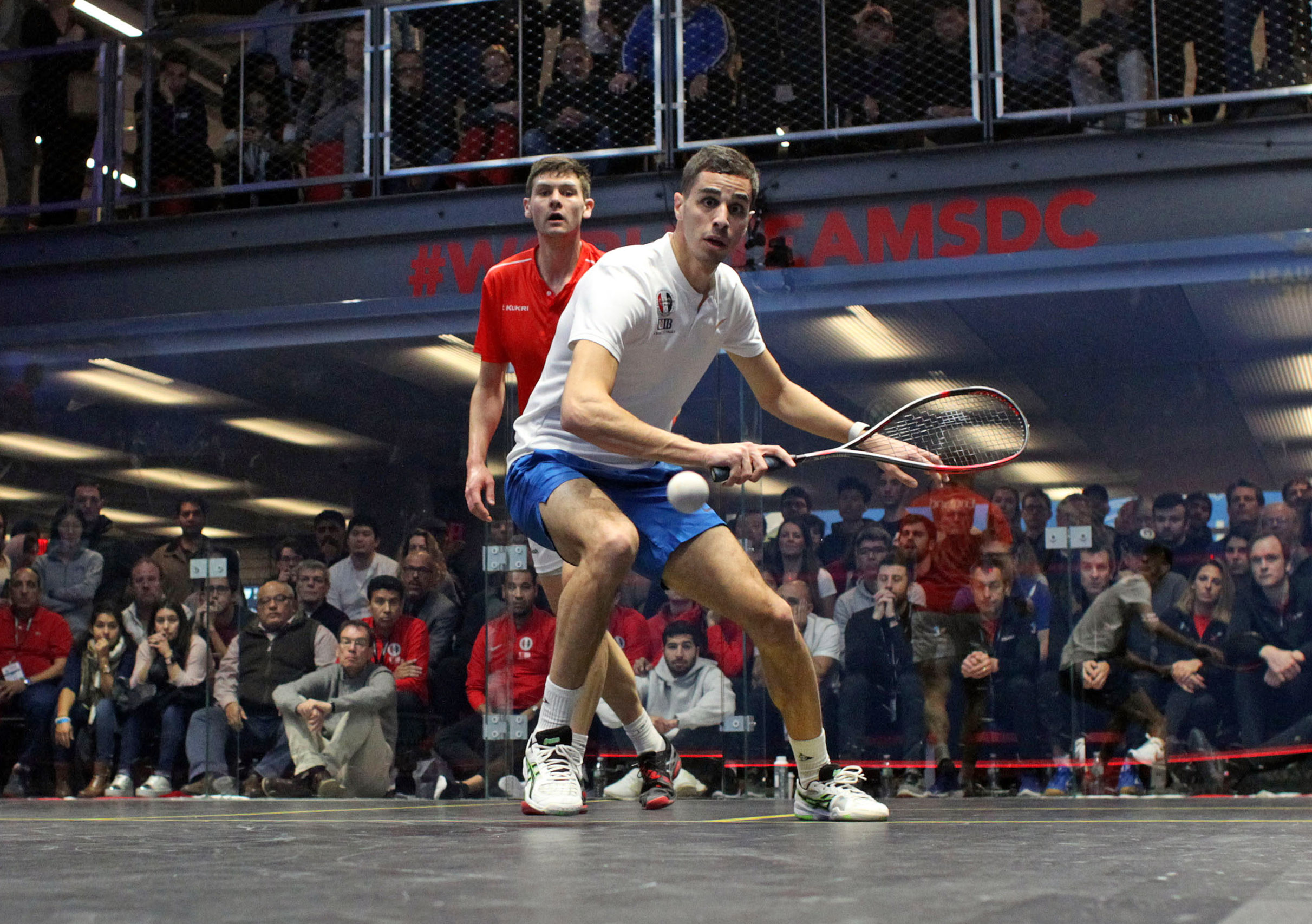By Chris McClintick
This past December in Washington, DC, the global pinnacle of men’s team squash, the World Squash Federation’s Men’s World Team Championship, arrived in the United States for the first time in the event’s fifty-year-history.
Squash on Fire, which opened in 2017, hosted the event in the diplomatic center of the United States. Situated in the capital’s West End just north of Foggy Bottom, the eight-court facility is surrounded by scores of embassies—the Tanzanian embassy is even located on the same block. Some neighboring embassies, unlike Tanzania, were represented on the squash courts and embassy staff were often in attendance. France’s ambassador to the U.S., Gérard Araud hosted the opening ceremony at the palatial French embassy. Spanish ambassador Santiago Cabanas watched Spain defeat South Africa 3-0. Australian ambassador, Joe Hockey, hit a few balls on court and watched the eight-time champion Aussies take on Hong Kong. And at the end of the week, Egyptian ambassador Yasser Reda lifted the championship trophy, helping celebrate his nation’s victory.
Twenty-three nations entered the twenty-sixth staging of the biennial world championships, which alternates every other year with the Women’s World Team Championship. Canada was the only other previous North American host; they defeated Pakistan in the 1977 final in Toronto. While the U.S. already stages more than a quarter of events on the PSA World Tour, the tournament provided an opportunity for American squash fans to watch the more than a hundred players compete over the course of eight days. College and high school teams and squash fans from around the world packed the galleries, and SquashTV provided unparalleled streaming coverage of all four courts in play.
Egypt and England entered the tournament as the one and two seeds. They have dominated the last six Men’s World Teams, with both countries winning three titles since 2005 and having contested the past three finals against each other. Egypt’s squad included three of the world’s top five-ranked players in Ali Farag, Tarek Momen and Karim Abdel Gawad with a not-too-shabby world No. 10 Mohamed Abouelghar slotting in as the No. 4. France, the 2013 and 2017 hosts, weighed in as the three seeds and garnered many of the headlines leading into the event due to the return of former world champion Gregory Gaultier after a fifteen-month injury hiatus.

The Men’s World Teams always provide a wide-ranging example of global squash. Ten current or former College Squash Association players represented their countries: Ali Farag (Harvard/Egypt), Todd Harrity (Princeton/USA), Chris Hanson (Dartmouth/USA), Andrew Douglas (Penn/USA), Chris Binnie (Trinity/Jamaica), Bruce Burrowes (Western Ontario/Jamaica), Juan Camilo Vargas (Trinity/Colombia), Samual Kang (Princeton/Singapore) and Oisin Logan (George Washington/Ireland). There were sub top-200 players like Nigerian Sodiq Taiwo, who had played in just five career professional events, taking former world No. 1 James Willstrop to 14-12 in their first game or Korea’s world no. 438 Joong-Won Hwang facing off against France’s world No. 45 Baptiste Masotti. The most unusual participant was an actual amateur: forty-seven-year-old Steve Richardson. The Irishman, based in London, only played two professional matches ever in his career, in 2002, and has never held a world ranking. Washington was the sixth time he has represented Ireland in Men’s World Teams, going all the way back to 1995.
The early rounds of pool play yielded one major surprise in fifteenth-seeded Switzerland upsetting Team USA 2-1 to become the only non-top-twelve seed to reach the 1-12 playoff. The loss, on home soil, consigned the twelfth-seeded U.S. to the 13-20 playoff. The Americans–consisting of Harrity, Hanson, Douglas and veteran Chris Gordon–rebounded by winning their remaining three matches against Jamaica, Argentina and a 2-0 win in the thirteenth-place playoff against their oldest rivals, Canada.
Eleven seeds Wales proved to be the surprise package of the 1-12 playoff. Led by world No. 12 Joel Makin, Wales upset six seeds Hong Kong and edged British rivals Scotland 2-0 to reach the nation’s first Men’s World Teams semifinal in two decades where they met Egypt. The Welshmen nearly caused the upset of the tournament when Joel Makin staked them a 1-0 lead with his first career victory against Momen. Gawad and Abouelghar righted the ship to seal Egypt’s passage into the final with a 2-1 semifinal win. England and France put on a show in their own semifinal encounter. Declan James and Adrian Waller registered vital wins against Gregoire Marche and Mathieu Castagnet, despite heroics from Gregory Gaultier who toppled James Willstrop.

The fourth consecutive final between Egypt and England was a dramatic showcase of team squash. An intense opener saw world No. 24 James producing the best squash of his career against world No.3 Gawad. In the fifth game he grabbed a remarkable 9-7 lead before Gawad clawed back late to give Egypt a vital first point, 9-11, 11-4, 9-11, 11-9, 12-10 after 107 minutes. Farag, who sustained an individual loss against Germany’s Simon Rosner in the quarterfinals, resurrected his best squash of the tournament to clinch the title against a motivated Waller 11-6, 11-6, 12-14, 11-4 in fifty-seven minutes. The title marked Egypt’s fourth in the past five Men’s World Teams and fifth overall.
Egypt will be motivated to augment their recent domination of the Men’s World Teams, with their sights now set on Australia’s all-time title record of eight. While Egypt now stand level with England on five titles, the English have the footnote of two titles won by a combined Great Britain team in 1976 and 1979. The location of the 2021 WSF Men’s World Team Championship is yet unknown, however one certainty is that Egypt will return to the tournament as the heavy favorites to retain their position atop of the world.



